Forward Proxy Server: Elevating Privacy & Enhancing Speed
In the expansive digital landscape, a forward proxy server serves as a beacon, guiding users towards better privacy and potentially faster connection speeds. Learn about its crucial role in our latest blog.
What Is a Forward Proxy Server?
A forward proxy server is a computer system or an application that serves as a go-between for requests from clients seeking resources from other servers. It offers enhanced security by acting as a shield between users and the vast internet. Moreover, the forward proxy server grants users the ability to circumvent internet barriers, enabling them to access websites that might be blocked or limited.
However, it's essential to note that using a forward proxy to bypass restrictions can sometimes breach ethical or legal boundaries. Users should always ensure they're using these tools responsibly and in line with any applicable regulations.
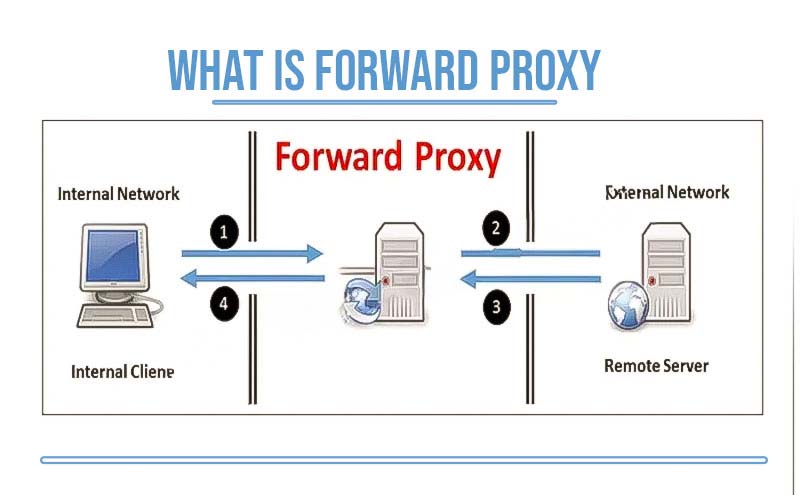
How Does a Forward Proxy Server Work?
When a user wants to access a specific website or online service, the initial request isn't sent straight to the intended website. Instead, it first goes to a forward proxy server.
This forward proxy server steps in and acts as an intermediary, making it seem to the outside world that the request is coming from the proxy, not from the user. This offers a layer of privacy and protection for the user.
After receiving the user's request, the proxy server then sends it to the intended website on the user's behalf. As far as this website is concerned, the connection looks like it's coming from the proxy server, not the user.
Once the intended website processes the request, it sends the information or content back to the proxy server.
Finally, the forward proxy server collects this response and sends it along to the original user who initiated the request.
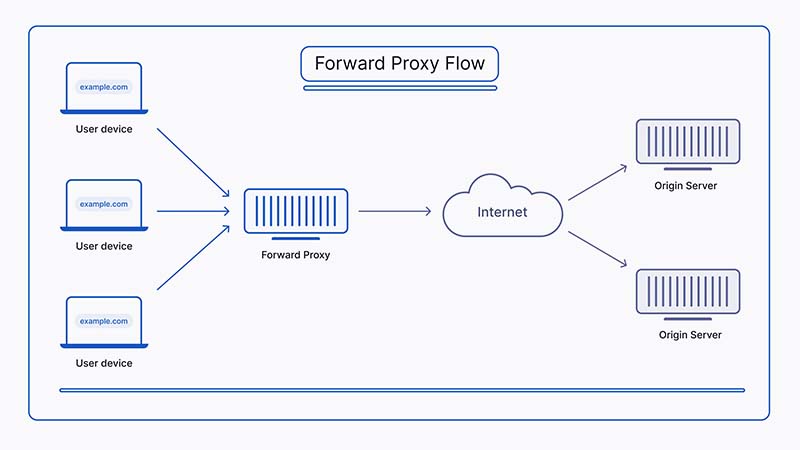
Benefits of a Forward Proxy Server
A forward proxy server brings several advantages to businesses and their employees:
User Privacy:
- The forward proxy stands as a shield between an individual's computer and the broader internet. It makes web requests for the user, rather than allowing the user’s device to do so directly.
- This process helps maintain user confidentiality, safeguarding personal and organizational data.
Policy Enforcement:
- Every bit of web data in a company goes through the forward proxy. This central point allows it to scrutinize both incoming and outgoing data.
- It ensures that users adhere to company-set security standards and acceptable online behaviors, reducing potential risks.
Traffic Visibility:
- The proxy is a checkpoint for all organizational web interactions.
- It offers a comprehensive view of how cloud systems, software applications, and third-party services are accessed and used, aiding in effective management and oversight.
Shadow IT Detection:
- Some devices or applications might be used within an organization without official IT consent, known as “shadow IT.” These often communicate with servers on the cloud. The forward proxy can spot these communications.
- Detecting such communications ensures that no unsanctioned devices or software compromise the network's integrity or security.
Improved Network Performance:
- Forward proxies store frequently visited web content, which means not every user request has to travel far across the internet.
- By reducing redundant web trips, the overall internet usage drops, making the network faster and more efficient while conserving bandwidth.
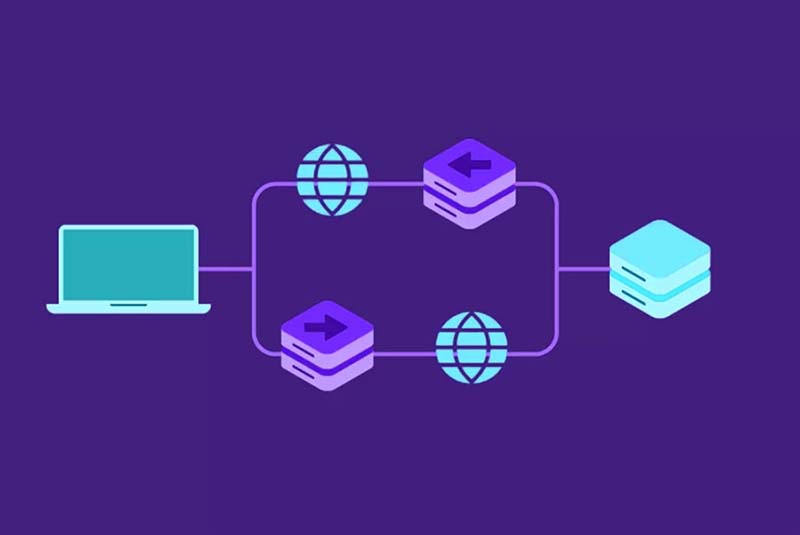
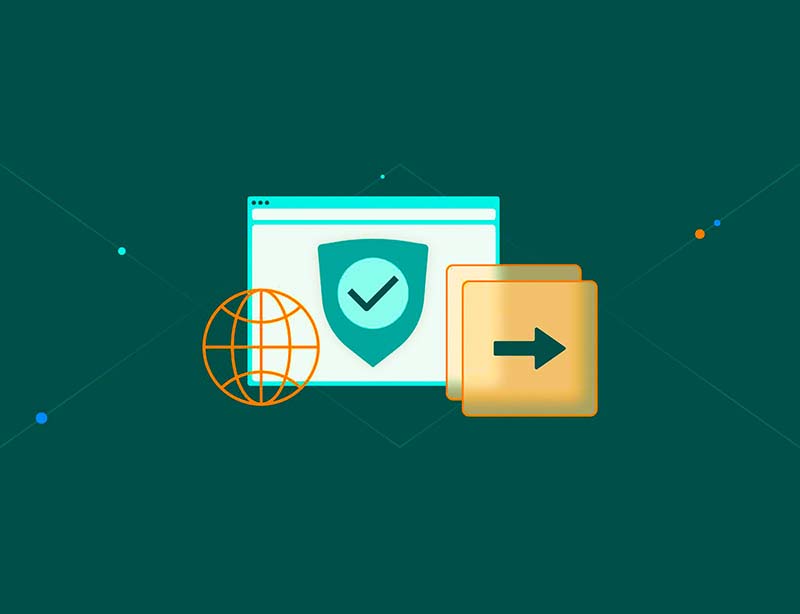
Forward Proxy Server Use Cases
A forward proxy plays a crucial role in overseeing and managing employees' interactions with the web. By understanding this system's functions, businesses can tap into enhanced online security. Below are cases where it can be used effectively:
Web Security:
- The forward proxy examines every web-related request originating from company devices. Through this lens, it can detect and deter visits to unauthorized websites or sift out harmful or unsuitable content from web responses.
- This ensures a safe browsing experience, shielding the organization and its employees from potentially harmful digital threats.
Data Security:
- Using cloud storage and external services brings about potential risks, especially if data management is careless. The forward proxy spots and halts traffic that might be inadvertently channeling confidential information to unintended places.
- Protecting sensitive corporate data remains paramount, and this function ensures that no data slips through unnoticed.
Corporate Privacy:
- All the organization's web interactions funnel through the forward proxy, which acts as a mask, hiding the intricate details of the company's network structure.
- By camouflaging these details, potential attackers find it challenging to sketch out the network or spot weak points to exploit, fortifying the company's digital defense.
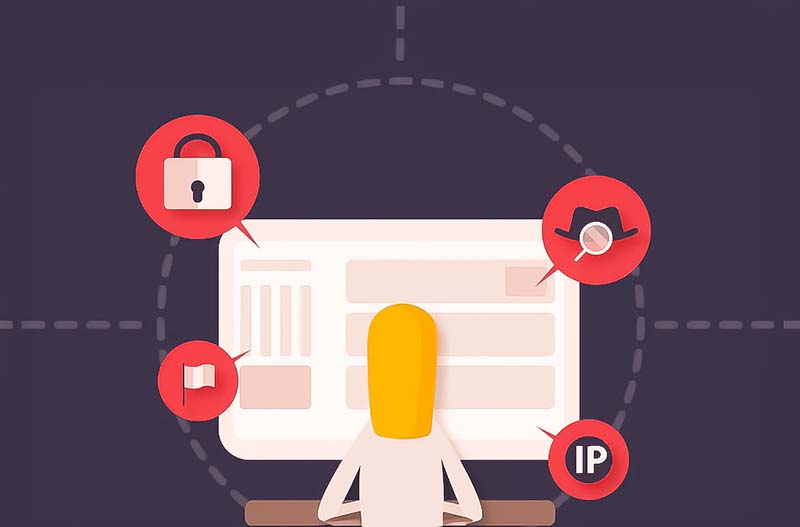
Forward Proxy vs Firewall
Both forward proxies and firewalls serve as gatekeepers in the digital realm, examining and managing traffic over a network. But they're not identical; each has its unique features and purposes. Here's a breakdown of their primary differences:
Primary Purpose:
- Its main role is ensuring privacy for internal users and enforcing company guidelines or policies for web usage.
- This tool focuses on controlling access across network borders and examines data packets to block potential threats.
Traffic Scope:
- Primarily zeroes in on inspecting and safeguarding web traffic.
- Broadens its reach to oversee all kinds of network traffic, ensuring a holistic defense.
Direction of Inspection:
- Keeps an eye on outbound requests (like when you browse a site) and then watches the incoming data.
- Monitors both outbound activities and incoming connections that aim to access the corporate network.
Layer of Operation:
- Operates mainly with web requests, engaging extensively at the application layer of the digital communication model.
- While advanced firewalls (called Next-Generation Firewalls or NGFWs) do inspect at the application layer, firewalls generally function at both the network and transport layers, offering a more foundational check.
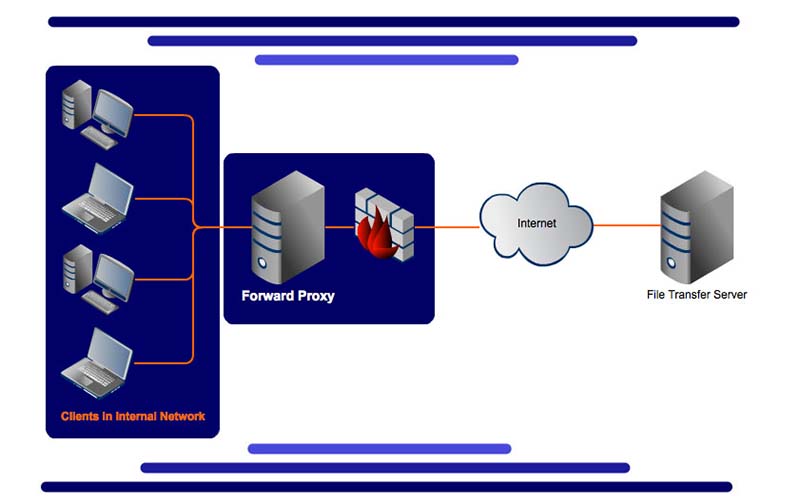
What’s the Difference Between a Forward Proxy and a Reverse Proxy?
In the world of online communication, both forward and reverse proxies are crucial, but they serve different purposes. Let's explore their differences to grasp them better.
Position and Purpose:
- Positioned in front of web servers, a reverse proxy ensures that web clients (like your browser) don't connect directly to these servers. Its role is somewhat like a protective shield for web servers.
- This one is placed before client devices. It intercepts and checks requests going out from the client, making sure web servers don't communicate directly with the client. Often, a software piece on the client's device aids this proxy in directing the traffic.
Operational Distinctions:
- It incorporates a feature known as a 'load balancer'. This feature manages high user demands by distributing incoming requests. If many people try to access a particular website simultaneously, the load balancer spreads this load to prevent any single server from becoming overwhelmed. This ensures quicker website load times and avoids server crashes.
- Unlike reverse proxies, forward proxies typically require a software agent on client devices to function correctly.
How Reverse Proxies Enhance Efficiency:
- Reverse proxies can store content temporarily. When clients ask for this content, the proxy delivers it without bothering the main server. This process, termed 'web acceleration', boosts speed and reduces server load.
- For vast websites using multiple servers, reverse proxies evenly distribute client requests among these servers, ensuring no single server bears the brunt of the traffic.
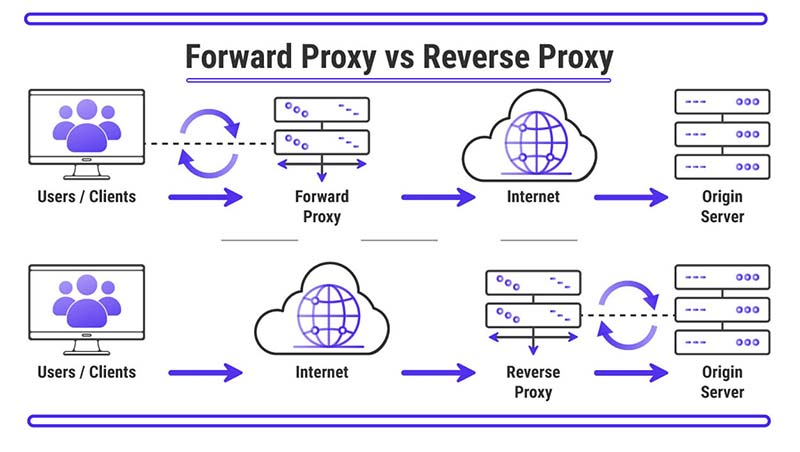
FAQ
Is using a forward proxy server secure?
While forward proxies enhance user anonymity, the security depends on whether the connection is encrypted (e.g., HTTPS). It's vital to choose reputable proxy providers, as untrustworthy ones can compromise data.
Do forward proxy servers affect internet speed?
Proxy servers may introduce delays depending on their setup and location. Yet, if they cache content, repeated access to that content can be quicker.
How do I set up my own forward proxy server?
You can use software like Squid or even use scripting languages, such as Python, to establish a forward proxy server.
Why do some websites block forward proxy servers?
Websites might block proxies to deter scraping, uphold geo-restrictions, guard against potential threats, or maintain content integrity.
What are some potential drawbacks of using a forward proxy server
Using a forward proxy requires regular updates and maintenance for optimal security and performance. Before activating a proxy, ensure only authorized clients can access it to prevent misuse.
Conclusion
In conclusion, a forward proxy server acts as a vital intermediary, providing anonymity and potential speed benefits, though with considerations for setup, security, and website accessibility. It's essential to understand its intricacies and implications in the dynamic digital realm. For more insights and in-depth knowledge on related topics, don't hesitate to explore our other blogs at 9Proxy. We're here to guide you through the ever-evolving world of technology.
Get Newsletters About Everything Proxy-Related